|
|
|
Sort Order |
|
|
|
Items / Page
|
|
|
|
|
|
|
| Srl | Item |
| 1 |
ID:
130458


|
|
|
|
|
| Publication |
2014.
|
| Summary/Abstract |
The energy business has a way of making smart people look dumb. Experts were blindsided by the shale revolution in the United States. For most of the last few decades, they had assumed that U.S. domestic energy supplies were dwindling. Then, advances in horizontal drilling and hydraulic fracturing, or "fracking" -- the injection of high-pressure streams of sand, water, and chemicals into underground shale and other rock to unlock oil and natural gas trapped there -- significantly boosted total U.S. natural gas production, by as much as 25 percent in recent years, forcing many experts to change their tune. Horizontal drilling and fracking are now having an even bigger impact on domestic oil production: five years ago, most new onshore rigs were drilling for shale gas, but today, most are drilling for oil in shale and so-called tight rock formations. Experts are confidently pointing to the benefits of abundant supplies of this unconventional oil and gas for the U.S. economy: lower energy costs, new jobs, and even a revival in some parts of the manufacturing sector. Politicians from both parties, meanwhile, are vying to be the most enthusiastic boosters of domestic natural gas.
|
|
|
|
|
|
|
|
|
|
|
|
|
|
|
|
| 2 |
ID:
130461


|
|
|
|
|
| Publication |
2014.
|
| Summary/Abstract |
In 1896, a 33-year-old engineer working for the Detroit branch of Thomas Edison's Edison Illuminating Company traveled to New York for the firm's annual convention. The automobile was the obvious technology of the future by then, but it wasn't yet clear what would propel it: steam, electricity, or gasoline. Edison had been tinkering with batteries that could power a car, so he was interested to hear that the engineer from Detroit had invented a two-cylinder gasoline vehicle. After hearing a description of the car, Edison immediately recognized its superiority.
|
|
|
|
|
|
|
|
|
|
|
|
|
|
|
|
| 3 |
ID:
130472


|
|
|
|
|
| Publication |
2014.
|
| Summary/Abstract |
The United States is in the early stages of a substantial national project: reorienting its foreign policy to commit greater attention and resources to the Asia-Pacific region. This reformulation of U.S. priorities has emerged during a period of much-needed strategic reassessment, after more than a decade of intense engagement with South Asia and the Middle East. It is premised on the idea that the history of the twenty-first century will be written largely in the Asia-Pacific, a region that welcomes U.S. leadership and rewards U.S. engagement with a positive return on political, economic, and military investments.
As a result, the Obama administration is orchestrating a comprehensive set of diplomatic, economic, and security initiatives now known as the "pivot," or "rebalancing," to Asia. The policy builds on more than a century of U.S. involvement in the region, including important steps taken by the Clinton and George W. Bush administrations; as President Barack Obama has rightly noted, the United States is in reality and rhetoric already a "Pacific power." But the rebalancing does represent a significant elevation of Asia's place in U.S. foreign policy.
Questions about the purpose and scope of the new approach emerged as soon as Secretary of State Hillary Clinton offered what remains the clearest articulation of the strategy, and first used the term "pivot" to describe it, in a 2011 article in Foreign Policy. Almost three years later, the Obama administration still confronts the persistent challenge of explaining the concept and delivering on its promise. But despite the intense scrutiny and short-term setbacks faced by the policy, there is little doubt that a major shift is well under way. And whether Washington wants it to or not, Asia will command more attention and resources from the United States, thanks to the region's growing prosperity and influence -- and the enormous challenges the region poses. The question, then, is not whether the United States will focus more on Asia but whether it can do so with the necessary resolve, resources, and wisdom.
|
|
|
|
|
|
|
|
|
|
|
|
|
|
|
|
| 4 |
ID:
130475
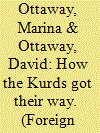

|
|
|
|
|
| Publication |
2014.
|
| Summary/Abstract |
The surge of ethnic and sectarian strife in Syria and across the Middle East has led a number of analysts to predict the coming breakup of many Arab states. This potential upending of the region's territorial order has come to be known as "the end of Sykes-Picot," a reference to the secret 1916 Anglo-French agreement to divide up the Middle Eastern provinces of the Ottoman Empire into British and French zones of control. Because the European treaties that created new Arab states in the aftermath of World War I upheld the outlines of that agreement, Sykes-Picot became the convenient shorthand for the map that colonial powers imposed on the region, one that has remained essentially constant to the present day.
With bloodshed from Aleppo to Baghdad to Beirut, it is indeed tempting to predict the violent demise of Sykes-Picot. But although the worst fighting is spilling over borders and pushing some countries, such as Syria, toward fragmentation, there is another force crossing national lines and even realigning national relationships: trade. New transnational zones of economic cooperation are making Middle Eastern borders more porous, but in a way that does not directly challenge existing states. Instead, mutual economic interests, especially in the oil and gas industries, may signal a softer end to Sykes-Picot.
|
|
|
|
|
|
|
|
|
|
|
|
|
|
|
|
| 5 |
ID:
130470


|
|
|
|
|
| Publication |
2014.
|
| Summary/Abstract |
Walter Russell Mead paints a disturbing portrait of the United States' geopolitical predicament. As he sees it, an increasingly formidable coalition of illiberal powers -- China, Iran, and Russia -- is determined to undo the post-Cold War settlement and the U.S.-led global order that stands behind it. Across Eurasia, he argues, these aggrieved states are bent on building spheres of influence to threaten the foundations of U.S. leadership and the global order. So the United States must rethink its optimism, including its post-Cold War belief that rising non-Western states can be persuaded to join the West and play by its rules. For Mead, the time has come to confront the threats from these increasingly dangerous geopolitical foes.
|
|
|
|
|
|
|
|
|
|
|
|
|
|
|
|
| 6 |
ID:
130471
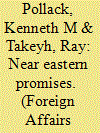

|
|
|
|
|
| Publication |
2014.
|
| Summary/Abstract |
Contrary to popular myths and conspiracy theories about Washington's desire to control the Middle East, for the past six decades, U.S. policymakers have usually sought to minimize the United States' involvement there. But the high-stakes nature of American interests in the region -- particularly oil -- and the complexity of the Middle East's problems always seem to draw the United States back in. In spite of himself, U.S. President Dwight Eisenhower was sucked into the Suez crisis in 1956 and the pan-Arabist revolts of the late 1950s. Lyndon Johnson barely lifted a finger to prevent the Six-Day War in 1967. Richard Nixon found himself grudgingly drawn into the region by the 1973 Arab-Israeli war and the superpower nuclear crisis it caused. Despite his aggressive image, Ronald Reagan did little in response to repeated attacks in Lebanon and the Persian Gulf by Iran and its proxies. George H. W. Bush came to office hoping to ignore Saddam Hussein, not to go to war with him. And although it is rarely remembered today, George W. Bush was not particularly interested in the Middle East and paid little attention to the region prior to the 9/11 attacks.
|
|
|
|
|
|
|
|
|
|
|
|
|
|
|
|
| 7 |
ID:
130464
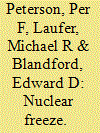

|
|
|
|
|
| Publication |
2014.
|
| Summary/Abstract |
Nuclear power remains the best way to produce large amounts of electricity reliably for homes and businesses. That is why the continuing deficit in nuclear innovation is so troubling, and why Washington needs to seek additional strategies to incentivize and support progress.
These days, the long-term role that nuclear power will play in the global energy market remains uncertain. That would have come as a surprise to the scientists and engineers who, during the 1950s and 1960s, pioneered the study of nuclear fission, built test reactors, and designed nuclear-powered airplanes and rockets. They would also have been surprised, and likely dismayed, that the light-water reactor -- the technology that powered the first nuclear submarine, in 1954 -- remains the dominant commercial technology for producing fission energy.
|
|
|
|
|
|
|
|
|
|
|
|
|
|
|
|
| 8 |
ID:
130465
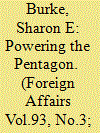

|
|
|
|
|
| Publication |
2014.
|
| Summary/Abstract |
The Defense Department is the United States' largest energy consumer, but it's also a major incubator of cutting-edge technologies. To cut fuel demands and meet new threats, the Pentagon is transforming the U.S. military from an organization that uses as much fuel as it can get to one that uses only as much as it needs.
In the immediate aftermath of World War II, the U.S. naval aviator Thomas Moorer questioned Takeo Kurita, a former vice admiral of the Imperial Japanese Navy, as part of the U.S. military's postwar interrogation of Japanese commanders. Kurita told Moorer that one of the most significant reversals of fortune Japan had suffered during the war was the loss of fuel supplies. "We ran out of oil," Kurita said, and by the end of the war, the Japanese military had grown so desperate, it was operating its equipment on fuel distilled from old tires, rice, and even pine needles. "What I learned then," Moorer would note years later, "was never lose a war, and the way to lose a war is to run out of oil."
|
|
|
|
|
|
|
|
|
|
|
|
|
|
|
|
| 9 |
ID:
130466
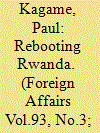

|
|
|
|
|
| Publication |
2014.
|
| Summary/Abstract |
On April 6, 1994, a plane carrying Rwandan President Juvénal Habyarimana was shot down by unidentified assailants. The next day, the killings began. Over the next three months, as the international community stood by, an estimated one million Rwandans-Tutsis and moderate Hutus-were systematically slaughtered by Hutu extremists, mostly using clubs and machetes. The genocide, one of history's worst and certainly its quickest, finally ended in July, when the Rwandan Patriotic Front seized control of the country. The rebel army was led by a 36-year-old Tutsi former refugee named Paul Kagame, who promptly took political control: serving first as the de facto leader of the country while defense minister and vice president and then, in 2000, assuming the presidency. During Kagame's two-decade rule, Rwanda has made spectacular progress. A country famously deemed "nonviable" in the mid-1990s has become one of Africa's best-run, most orderly, least corrupt, and safest states, with a booming economy (Rwanda's GDP has grown by an average of eight percent in recent years). But Rwanda's success has come with a darker side: opposition politicians have been jailed or killed under mysterious circumstances, journalists complain of harassment, and Kigali has been regularly criticized for meddling in neighboring Congo's long-running civil war. In late February, Kagame met with Foreign Affairs managing editor Jonathan Tepperman in Kigali to discuss these controversies, his tenure, Rwanda today, and the legacy of the mass killings two decades ago.
|
|
|
|
|
|
|
|
|
|
|
|
|
|
|
|
| 10 |
ID:
130474
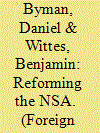

|
|
|
|
|
| Publication |
2014.
|
| Summary/Abstract |
The long-running debate over the tradeoffs the United States should make between national security and civil liberties flared up spectacularly last summer, when Edward Snowden, a National Security Agency contractor, handed journalists a huge trove of heavily classified documents that exposed, in excruciating detail, electronic surveillance programs and other operations carried out by the NSA. Americans suddenly learned that in recent years, the NSA had been acquiring the phone and Internet communications of hundreds of thousands of U.S. citizens, as well as collecting massive volumes of bulk telephone records known as "metadata" -- phone numbers and the time and length of calls. Along with the rest of the world, Americans found out that the NSA had broken common forms of online encryption, tapped the phones of various foreign heads of state, and monitored global communications far more aggressively than was previously understood.
|
|
|
|
|
|
|
|
|
|
|
|
|
|
|
|
| 11 |
ID:
130469
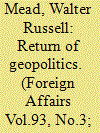

|
|
|
|
|
| Publication |
2014.
|
| Summary/Abstract |
So far, the year 2014 has been a tumultuous one, as geopolitical rivalries have stormed back to center stage. Whether it is Russian forces seizing Crimea, China making aggressive claims in its coastal waters, Japan responding with an increasingly assertive strategy of its own, or Iran trying to use its alliances with Syria and Hezbollah to dominate the Middle East, old-fashioned power plays are back in international relations. The United States and the EU, at least, find such trends disturbing. Both would rather move past geopolitical questions of territory and military power and focus instead on ones of world order and global governance: trade liberalization, nuclear nonproliferation, human rights, the rule of law, climate change, and so on. Indeed, since the end of the Cold War, the most important objective of U.S. and EU foreign policy has been to shift international relations away from zero-sum issues toward win-win ones. To be dragged back into old-school contests such as that in Ukraine doesn't just divert time and energy away from those important questions; it also changes the character of international politics. As the atmosphere turns dark, the task of promoting and maintaining world order grows more daunting. But Westerners should never have expected old-fashioned geopolitics to go away. They did so only because they fundamentally misread what the collapse of the Soviet Union meant: the ideological triumph of liberal capitalist democracy over communism, not the obsolescence of hard power. China, Iran, and Russia never bought into the geopolitical settlement that followed the Cold War, and they are making increasingly forceful attempts to overturn it. That process will not be peaceful, and whether or not the revisionists succeed, their efforts have already shaken the balance of power and changed the dynamics of international politics.
|
|
|
|
|
|
|
|
|
|
|
|
|
|
|
|
| 12 |
ID:
130477


|
|
|
|
|
| Publication |
2014.
|
| Summary/Abstract |
Twenty years ago, in 100 days of slaughter between April and July 1994, an estimated one million Rwandan men, women, and children were killed by their fellow citizens. It was one of the worst genocides in history, and its effects still ripple through Rwanda, central and eastern Africa, and the world at large. It would be obscene to say that such a catastrophe has had even the thinnest silver lining. But it did create a natural -- or unnatural -- experiment, as the country's social, economic, and political institutions were wiped out by the genocide. And in important respects, the reconstructed Rwanda that emerged over the next two decades is a dramatically different country. One major improvement has come in the leadership of Rwandan women, who have made history with their newly vital role in politics and civil society. No longer confined to positions of influence in the home, they have become a force from the smallest village council to the highest echelons of national government. Understanding how and why such a transformation occurred offers not just an opportunity to celebrate their accomplishments. It also provides lessons for other countries struggling to overcome histories of patriarchy and oppression.
|
|
|
|
|
|
|
|
|
|
|
|
|
|
|
|
| 13 |
ID:
130468
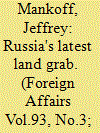

|
|
|
|
|
| Publication |
2014.
|
| Summary/Abstract |
Russia's occupation and annexation of the Crimean Peninsula in February and March have plunged Europe into one of its gravest crises since the end of the Cold War. Despite analogies to Munich in 1938, however, Russia's invasion of this Ukrainian region is at once a replay and an escalation of tactics that the Kremlin has used for the past two decades to maintain its influence across the domains of the former Soviet Union. Since the early 1990s, Russia has either directly supported or contributed to the emergence of four breakaway ethnic regions in Eurasia: Transnistria, a self-declared state in Moldova on a strip of land between the Dniester River and Ukraine; Abkhazia, on Georgia's Black Sea coast; South Ossetia, in northern Georgia; and, to a lesser degree, Nagorno-Karabakh, a landlocked mountainous region in southwestern Azerbaijan that declared its independence under Armenian protection following a brutal civil war. Moscow's meddling has created so-called frozen conflicts in these states, in which the splinter territories remain beyond the control of the central governments and the local de facto authorities enjoy Russian protection and influence.
|
|
|
|
|
|
|
|
|
|
|
|
|
|
|
|
| 14 |
ID:
130473
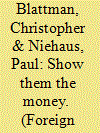

|
|
|
|
|
| Publication |
2014.
|
| Summary/Abstract |
Every year, wealthy countries spend billions of dollars to help the world's poor, paying for cows, goats, seeds, beans, textbooks, business training, microloans, and much more. Such aid is designed to give poor people things they can't afford or the tools and skills to earn more. Much of this aid undoubtedly works. But even when assistance programs accomplish things, they often do so in a tremendously expensive and inefficient way. Part of this is due to overhead, but overhead costs get far more attention than they deserve. More worrisome is the actual price of procuring and giving away goats, textbooks, sacks of beans, and the like.
Most development agencies either fail to track their costs precisely or keep their accounting books confidential, but a number of candid organizations have opened themselves up to scrutiny. Their experiences suggest that delivering stuff to the poor is a lot more expensive than one might expect.
Take cows. Many Western organizations give poor families livestock, along with training in how to raise and profit from the animals. Cows themselves usually cost no more than a few hundred dollars each, but delivering them -- targeting recipients, administering the donations, transporting the animals -- gets expensive. In West Bengal, India, for example, the nonprofit Bandhan spends $331 to get $166 worth of local livestock and other assets to the poor, according to a report by the rating agency Micro-Credit Ratings International. Yet even this program sounds like a bargain compared to others. In Rwanda, a study led by the economist Rosemary Rawlins found that the cost of donating a pregnant cow, with attendant training classes and support services, through the charity Heifer International can reach $3,000.
|
|
|
|
|
|
|
|
|
|
|
|
|
|
|
|
| 15 |
ID:
130454
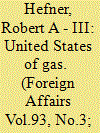

|
|
|
|
|
| Publication |
2014.
|
| Summary/Abstract |
Less than a decade ago, the future of American energy looked bleak. Domestic production of both oil and gas was dwindling, and big U.S. energy companies, believing their fortunes lay offshore, had long since turned away from the mainland. But then something remarkable occurred: a surge of innovation allowed companies to extract vast quantities of natural gas trapped in once-inaccessible deposits of shale. The resulting abundance drove down U.S. gas prices to about one-third of the global average.
|
|
|
|
|
|
|
|
|
|
|
|
|
|
|
|
| 16 |
ID:
130467
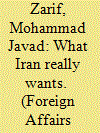

|
|
|
|
|
| Publication |
2014.
|
| Summary/Abstract |
Foreign policy is a critical component in the lives, conduct, and governance of all nation-states. But it has become even more significant in recent years as interstate relations have grown ever more complex. The inexorable rise in the number of international players -- including multilateral organizations, nonstate actors, and even individuals -- has further complicated policymaking. Meanwhile, the ongoing process of globalization -- however conceived and defined, whether lauded or despised -- has brought its inescapable weight to bear on the foreign policies of all states, whether large or small, developed or developing.
Since its establishment by a popular revolution in 1979, the Islamic Republic of Iran has grappled with these challenges. The postrevolutionary foreign policy of Iran has been based on a number of cherished ideals and objectives embedded in the country's constitution. These include the preservation of Iran's independence, territorial integrity, and national security and the achievement of long-term, sustainable national development. Beyond its borders, Iran seeks to enhance its regional and global stature; to promote its ideals, including Islamic democracy; to expand its bilateral and multilateral relations, particularly with neighboring Muslim-majority countries and nonaligned states; to reduce tensions and manage disagreements with other states; to foster peace and security at both the regional and the international levels through positive engagement; and to promote international understanding through dialogue and cultural interaction.
|
|
|
|
|
|
|
|
|
|
|
|
|
|
|
|
|
|
|
|
|